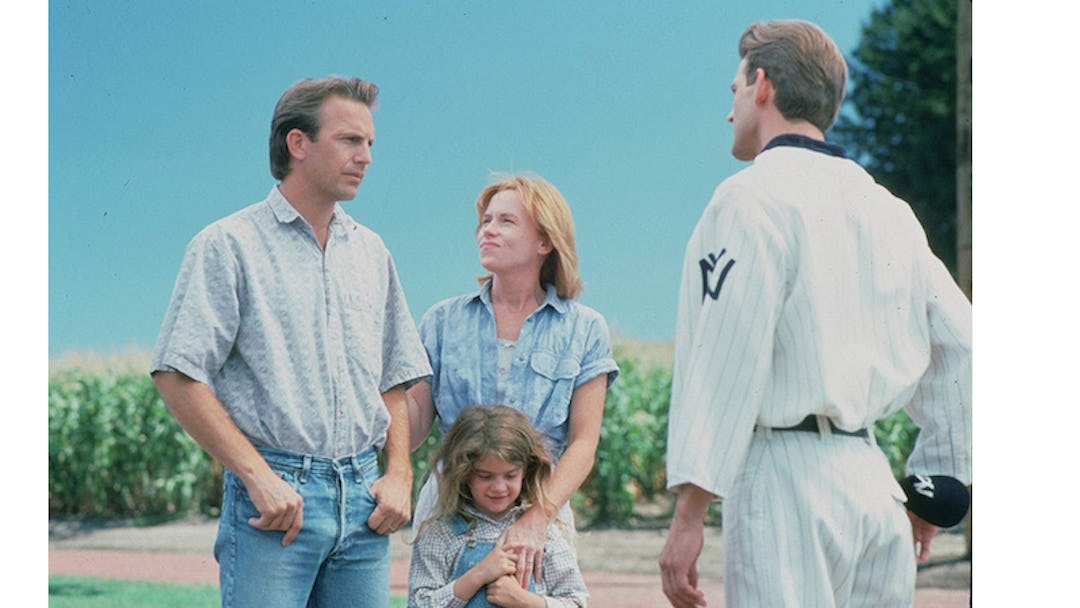Here’s the funny thing about Field of Dreams: it’s the kind of movie I don’t want to like, and there are a handful of reasons why. First of all, as a grown-up in a post-Waterworld/The Postman world, Kevin Costner’s film presence has become a quick and easy punchline, and anything featuring the actor is a bit of a turn-off. Secondly, Field of Dreams is one of those modern family classics that was almost a staple, and anything so cheesy and PG shouldn’t actually be good. That it features one of the most memorable lines in recent film history has only made the film seem too accessible. And let’s not get started on its emotional manipulation; it practically turns men’s faces into salty sponges, just wringing the tears right out of them.
But I manage to forget all of this every time I watch it, usually because I catch it accidentally on TV. I seem to look past all of its shallow, surface-level qualities and remember that it’s not just a movie about baseball-playing ghosts, but rather a very fine film that is equal parts Americana, a study of fathers and sons, and a heartstring-tugging narrative that, yes, even makes me tear up by the end. (I’m not made of wood, after all.)
Movies about fathers and sons are typically more well-received than movies about mothers and daughters. Cinema has a way of depicting masculine emotional outpourings in a way that makes such a thing seem not taboo but a common occurrence. It’s a theme that pops up often, as recently as last fall’s Nebraska. A strained relationship between a son and his father is an oft-used premise; pairing that with sports, particularly the Great American Pastime, is almost too perfect, which is what makes Field of Dreams seem formulaic on paper. That the movie is set in America’s Heartland doesn’t do it any favors there, either.Yet the film, based on the novel Shoeless Joe by W. P. Kinsella, is a quite inventive one, and one that is still deserving of its accolades (it picked up three Oscar nominations in 1990, including Best Picture). It’s not exactly a sports movie; sure, baseball, specifically the story of the Black Sox Scandal at the 1919 World Series, is a backdrop, and it’s the love for the great game that can, at times, feel overwhelmingly masculine. It’s as much a story about pain and consequences — exemplified by the spirit of Shoeless Joe, who gets another chance at baseball in the Iowa cornfield — and the angry, reclusive writer Terrence Mann (played by James Earl Jones), a fictionalized version of J. D. Salinger. (Salinger, a character in Kinsella’s novel, threatened to sue if his likeness was used in the film.)
The saving grace of all of this masculine emotion delivered with a heavy hand by Kevin Costner’s lilt is Amy Madigan, who plays Costner’s wife. Her character, Annie, doesn’t feel like an accessory, or just a narrative device whose presence allows for a lot of explaining about the history of baseball and its cultural importance. Rather, she is on equal footing with her husband, and at times is much more assertive in her personality than the man she married.
That the pair has a daughter (played by a young Gaby Hoffmann) is an important detail: in a film in which the relationships between men and their sons are so overwhelming, it’s a smart, quiet choice to show Costner’s Ray sharing the love of the sport with his daughter — indicating that enthusiasm for the game, and the sharing of that eagerness, isn’t limited to gender. The film, in this way, is subtly progressive even as it is so often exploiting the feelings of the viewer, who is likely to succumb to the film’s blatant manipulations. “If you watch it, you will cry,” that ghostly voice could very well be whispering from that magical cornfield, where the ghosts of the shamed White Sox players, for whatever mystical reason, reside. It’s almost too obvious, which is why Field of Dreams works in the first place.
